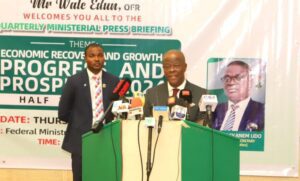
UBA Foundation opens portal for NEC 2022, set to receive digital applications, prize money up 40%
UBA Foundation, the corporate social responsibility arm of the United Bank for Africa (UBA) Plc, has announced the commencement of the 2022 edition of its National Essay Competition (NEC) in Nigeria with a call for entries.
The annual National Essay Competition (NEC) is part of UBA Foundation’s education initiative which is aimed at promoting literacy and encouraging healthy and intellectual competition amongst senior secondary school students in Nigeria and across the African continent.
Now in its 12th edition, this year will witness increased participation of students from Senior Secondary Schools across Nigeria, who are now able to submit their entries with ease from the comfort of their homes or schools through the UBAF NEC digital submission portal: https://www.ubagroup.com/national-essay-competition/
For the past three years, UBA Foundation has been reviewing the prizes upwards to reflect economic realities and inflationary effects. The NEC 2022 prizes have increased significantly by 40per cent from last year.
The first prize winner will receive an educational grant of N5 million to study at any African university of their choice, up from the N3.5 million in 2021. The second and third prizes now stand at N3 million and N2.5 million educational grants rising from N2.5m and N2 respectively.
Also, winners of the 12 best essays will go home with brand new laptops and other educational tools to help them with their tertiary research work and other studies.
The Chief Executive Officer, UBA Foundation, Mrs. Bola Atta, said that with the digital submission portal, more students in secondary schools across the country will have the opportunity to scan and send in their entries and compete to win educational grants for study at any university of their choice on the African continent.
She said, “Over time, we have worked hard to ensure that our UBA Foundation programmes continue to impact lives in meaningful ways. We realise that the use of technologically driven initiatives is part of the modern day and we would like to reach students in their comfort zones.
“Every Nigerian high school student who wishes to, will be able to enter for the NEC 2022 and stand a chance to win a fully funded University education through the UBA Foundation,” Atta said.
The essay topic for this year is: ‘ASUU Strikes have often cost Nigerian students time. Advise the Nigerian government on how they can reach an agreement with ASUU to improve tertiary education in the country.’
All essays must be handwritten (not typed) and students have up until October 14th, 2022 to upload the scanned copies of their handwritten entries as well as their IDs on the digital portal at www.ubagroup.com/national-essay-competition. No physical copies will be accepted this year.
The submissions will be evaluated by judges who are professors from reputable Nigerian Universities. The professors will select the top 12 finalists who will take home consolation prizes including personal computers. These 12 finalists will write another supervised essay where the top three winners will be announced at the grand finale to be held in November at UBA’s head office in Lagos, Nigeria.
The National Essay Competition has been rolled out in other African countries where UBA operates, in order to open up the opportunity for more African children.
UBA Foundation embodies the UBA Group’s CSR objectives and seeks to impact positively on societies through several laudable projects and initiatives. The Foundation through its Education pillar has donated hundreds of thousands of books to students across Africa under the ‘Read Africa’ initiative aimed at encouraging and promoting the reading culture in African youths. Its National Essay Competition has also afforded the opportunity to hundreds of students to improve their lives through higher education.



